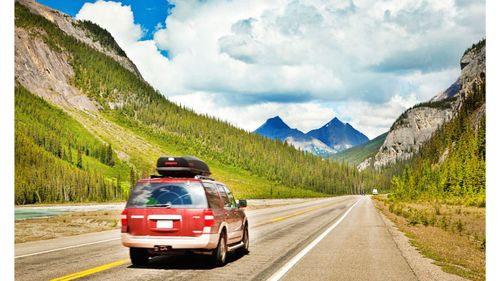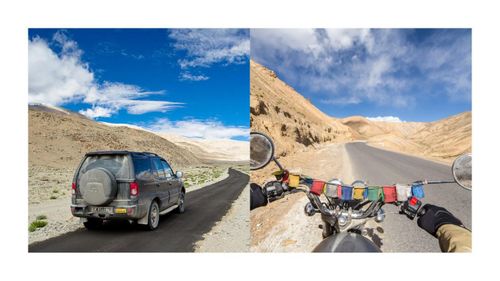The Road to Adventure: Planning the Ultimate Cross-Country Road Trip
By Vaishnavi

3824 Views
Tips for a successful cross-country road trip in India, from budgeting to transportation and packing

A cross-country road trip in India is a journey of discovery, a chance to explore the diverse landscapes, cultures, and traditions of this vast and vibrant country. From the snow-capped peaks of the Himalayas to the sun-drenched beaches of Goa, from the bustling cities of Delhi and Mumbai to the tranquil backwaters of Kerala, India offers an unparalleled array of experiences and attractions for the intrepid traveller.
A road trip in India is not just a mode of transportation, but an adventure in itself. As you travel across the country, you will encounter a kaleidoscope of sights, sounds, and flavours, each one reflecting the unique character of the region.
However, planning a cross-country road trip in India requires careful research and preparation. From choosing the right vehicle and route to understanding the local customs and etiquette, there are many factors to consider before embarking on this epic journey. Take the time to research your options and decide on a route that is in line with your interests and preferences.
Guide to the cross-country road trip
The mode of transportation

The mode of transportation you choose for your cross-country adventure is a crucial aspect of your planning process. Depending on your budget, comfort level, and itinerary, there are several options to consider-
Renting a car is a popular option for a cross-country road trip in India. It allows for greater flexibility and independence, and enables you to explore remote areas that are not accessible by public transport. However, it is important to note that driving in India can be challenging, with congested roads, erratic drivers, and varying road conditions. It is recommended to hire a driver or to be an experienced driver with knowledge of Indian road rules.
Whereas for the adventurous traveller, a motorcycle is an exciting and exhilarating way to explore India's diverse terrain. It allows for a more intimate connection with the landscape and the local culture, and provides a sense of freedom and adventure. However, it is important to note that riding a motorcycle in India can be dangerous, and requires a high level of skill and caution.
Research the destinations
Before you hit the road, take the time to research the destinations you plan to visit. Familiarise yourself with the attractions, restaurants, and events that each location has to offer. This way, you can make the most of your time and create unforgettable memories.
One of the best ways to research your destinations is to use online resources such as travel blogs, review sites, and social media. These resources can provide valuable information on popular attractions, local events, and recommended restaurants, as well as tips and advice from other travellers who have already visited the area. You can also consult travel guidebooks or talk to locals to get insider tips on the best places to visit.
In addition to researching your destinations, it is also important to have a backup plan in case of unexpected changes or unforeseen circumstances. This could include having a list of alternative activities or attractions to visit if your original plans fall through, or making sure you have enough flexibility in your itinerary to accommodate unexpected delays or changes in weather conditions.
Budgeting
Budgeting is an essential aspect of any road trip, and cross-country trips are no exception. Determine your budget, taking into account the cost of gas, food, accommodations, and activities. Use online resources to estimate the cost of gas and plan for any unforeseen expenses depending on the distance you plan to cover, the type of vehicle you use, and the current fuel prices. You can use online resources to estimate the fuel cost and plan accordingly.
Food is another essential expense to factor in. Depending on your preferences, you may choose to eat at local restaurants or prepare your meals using a portable stove or grill. Make a rough estimate of your daily food expenses and include it in your budget.
Accommodation is also a significant expense, especially if you plan to stay in hotels or resorts. Research different options and choose the ones that fit your budget. You can also consider camping or staying in hostels to save on accommodation costs.
Activities and sightseeing can also add up to your expenses. Make a list of the places you want to visit and the activities you want to do, and research the admission fees and other costs associated with them.
Choice of accommodation
Your choice of accommodations can have a significant impact on your overall road trip experience. Determine the type of accommodation that appeals to you- whether it be hotels, motels, or camping. Be sure to book your accommodation in advance to avoid any last-minute disappointments, particularly if you are visiting popular destinations during peak travel seasons.
While you may save on airfare, road trips are not necessarily cheap. Therefore, it is essential to establish a budget and stick to it. When it comes to accommodations, there are plenty of opportunities to save money. As a result, you can set a budget of, for example, INR 50,000 per month for lodging. Although it may appear to be a substantial amount, it equates to around INR 1,667 per night. A quick search on popular travel websites will reveal that you can discover a variety of budget-friendly accommodations in India for that price.
Airbnb is also an excellent option for budget-conscious travellers. With an extensive selection of reasonably priced rooms and apartments, you may discover that you can save even more money on your trip. However, it is critical to do your research and read reviews to ensure that you are getting a good deal while still having a safe and pleasant experience.
Packing Strategically
Packing for a cross-country road trip requires a strategic approach to ensure that you have everything you need while still being mindful of space and weight restrictions. It is advisable to create a packing list that includes essentials such as clothing, toiletries, snacks, and entertainment options. Packing a cooler with food and beverages can also save you money on meals during your journey.
While it's also essential to be prepared for any eventuality, you don't want to weigh down your car with unnecessary items. Therefore, packing less is often the way to go. Carrying a single carry-on each can save you time while checking in and out of different accommodations every day.
When it comes to car essentials, a first aid kit, portable cell phone batteries, extra USB cables, a spare tire, and jumper cables are all must-haves. Additionally, sheets, a pillow, and an air mattress designed to fit in the trunk can come in handy in case you need to spend a night in your car.
And before you hit the road make sure…
Before embarking on a road trip, ensure that your vehicle is in good working condition by checking the lights, oil level, air filter, spark plugs, and coolant. Also, keep a spare key, registration, and copies of your driver's licence and insurance information in the glove box.
If renting a car, make sure to choose one with unlimited mileage and purchase the best available insurance to avoid any unforeseen expenses.
Despite your best efforts, unexpected events can occur on a road trip. It is essential to remain flexible and prepared to make adjustments to your itinerary if necessary. Stay open to new experiences and embrace any opportunities that come your way.
Ultimately, a cross-country road trip is an adventure of a lifetime. Savour the journey, take in the breathtaking scenery, and indulge in new experiences. Capture your memories by taking photographs and journaling your experiences.